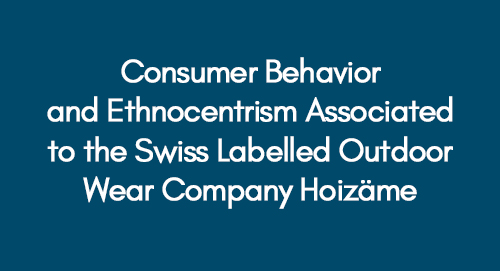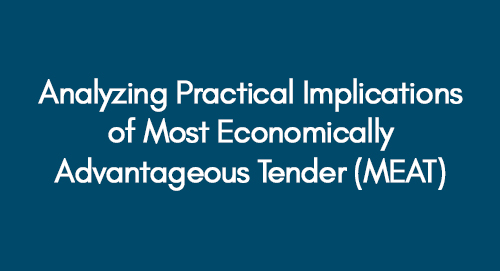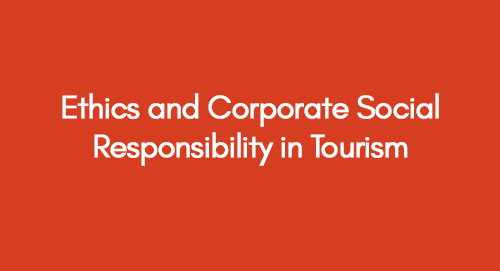
Consumer Behavior and Ethnocentrism Associated to the Swiss Labelled Outdoor Wear Company Hoizäme
June 2, 2022
Analyzing Practical Implications of Most Economically Advantageous Tender (MEAT)
June 2, 2022Introduction
Any kind of business cannot isolate itself from society because its customers, employees, and suppliers do belong to a society that had a direct influence on its practices. Concerning the tourism industry, it had been criticized by Horng, Hsu, and Tsai, (2019) that the tourism industry provides services that can directly impact society. The delivery of such services requires the tourism industry to perform its activities under developed ethics and corporate social responsibility.
These developed ethical practices help the tourism industry in performing their side of corporate social responsibility practices that can support the overall growth of the industry positively. It had been criticized by Kasemsap, (2018) that European countries are those countries that had provided great opportunities for tourism practices in their society that had also supported the increase in the display of corporate social responsibility to society. The tourism market of the European countries demands a certain level of tourism products that are supported by existing famous societal myths so the tourists can feel intrigued and felt attached to the place.
CSR and Ethical Activities in the Tourism Industry
Kim, et al., (2018) criticized the CSR activities that are been performed in the tourism practices of any country are generally based on the behaviors of the society where they are working. It had been argued by Fennell (2015) that the main purpose of the tourism business is to deliver the desired goods and services to the target tourists at a profit so that they can easily contribute to society’s well-being. It was also argued by Arora, and Walia, (2019) that only performing the activities related to social responsibility cannot help the tourism industry in developing solutions for the business problems that are been experienced during the performance of those activities. Moreover, Ma, Zhang, and Xue, (2017) affirmed that these problems can only be solved when the tourism industry of the region follows certain ethical practices and integrate those ethical practices into the daily activities and performance of the business.
Font, Garay, and Jones, (2016) had criticized that business practices that are been performed by the tourism industry are based on the attainment of their objectives effectively. The tourism businesses had to perform different corporate social responsibilities (CSR) activities that can help them in supporting their overall business growth (Melubo, and Lovelock, 2018). Yet, these CSR activities must be developed under the guidance of business ethics. It had been argued by Lee, Kim, and Kim, (2018) that the tourism industry had observed a boom in the overall world economy that had helped in increasing the number of business opportunities in the society.
Yet, it had been critically acclaimed by Hughes, and Scheyvens, (2016) that the local population of the region, where the tourism activities are been performed, does not feel contented with the tourism practices that are been performed. This is because, the local population thinks that when tourists arrive in their country; they got deprived of the location for effectively having their holiday practices. It had been argued by Hatipoglu, Ertuna, and Salman, (2019) that the main problems that are experienced by the tourism industry in the region of Romania are ethical. That is, the practices performed by the tourism industry in supporting the tourists are based on creating destruction in the environment through the depletion of natural resources and sexual exploitation.
The tourism industry researchers of Romania, like Chilufya, Hughes, and Scheyvens, (2019) had also highlighted the impact of the increased level of reduction of natural resources from the region that is used by the tourists who come from different countries. Randle, Kemperman, and Dolnicar, (2019) highlighted that such a situation of reduction of resources and other sexual exploitation introduces different ethical dilemmas in tourism that directly affect the performance of any CSR activity. According to Randle, Kemperman, and Dolnicar, (2019), these ethical dilemmas took place in Romania when the tourism industry did not make confirmation of increasing the tourism operations toward the natural habitat of the country.
It was further criticized by Kim, Hlee, and Joun, (2016) that, when the Romanian Federation of Tourism and services had developed and introduced its plan to provide more space to the tourists of the region for exploring the vampire legends about Dracula; they failed in identifying any sort of the investment that can lift the image of Dracula myth theme park at the first place. But when the government officials make plans to shift the theme park toward the Transylvania region; they receive an investment of $15.6 million (IBT, 2019). It was further compared by Coroş, et al., (2017) that when the Dracula theme park will be opened to the masses, it will help the Romanian Tourism federation in delivering more ethical practices of tourism. These ethical practices of tourism will also help the tourism industry in performing effective practices related to CSR. It had been argued by Nicula, and Spânu, (2017) that the implication of ethics in tourism practices can be supportive of conducting CSR activities that suit the environment and provide great support to society's growth.
Drivers of ethics and CSR in tourism
In respect of Romania, when Carrigan, et al. (2017) are identifying the impact of ethics and CSR on the tourism practices, they also identify certain drivers that can support the CSR activities of the tourism industry while following the industry-related ethics. These basic drivers are in the relation to customers, and globalization practices of the tourism industry. The customers provide a level of demand for the tourism activities that can satisfy their needs related to tourism. It was compared to Fennell, (2015) that the globalization of the industry had been bringing many multinational companies towards the tourism industry with the potential to grow in the industry. When tourism organizations ethically perform their assigned tasks, then they are practicing an effective corporate responsibility. It was further criticized by Font, Garay, and Jones, (2016) that while tourism companies perform an effective level of CSR activities with the required level of ethics, the tourism businesses can be experiencing enhanced productivity with an increased level of competitiveness; and they display good corporate culture supporting business ethics and other concerning the information.
About identifying the place of ethics in the successful implementation of CSR activities in tourism, Carroll (2016) developed a CSR pyramid that identifies ethics been the main part of performing the CSR activities in any industry. According to Carroll, CSR activities of any industry are based on four main organizational responsibilities. These responsibilities are economic, legal, ethical, and philanthropic as shown in the picture below:

It had been affirmed by Amatulli, et al., (2018) that the use of the Carroll pyramid for implementing effective CSR practices in the tourism industry had certain advantages and disadvantages. These advantages and disadvantages are discussed below:

After the development of identifiable advantages and disadvantages of using the Carroll model in developing a sustainable tourism practice with ethical CSR practices, it was explained by Samuel, and Mqomboti, (2017) that tourism activities that are performed in the country like Romania help the economy in creating new jobs for the local people. These jobs provide great economic incentives to tourism locations. It had been discussed in the World Heritage Report developed by UNESCO World Heritage Watch that many of the world heritage places that provide tourism opportunities are very much mismanaged (WHW, 2019). About the mentioned heritage report, Memon, et al., (2019) had acclaimed the fact that even though. the tourism activities that are performed in Romania are mismanaged; still, these tourism activities are always increasing. This brings in the concept of performing ethical tourism practices that are developed for performing CSR activities.
Dracula Park Project
Grigoras and Albu, (2015) had acclaimed the fact that one of such tourist themes is provided by Dracula Park of Romania. The park was developed on the myth that Count Dracula was born in the place where the park is been developed. This myth had been taken very seriously by many Hollywood filmmakers and various articles and story writers. Thus, it had been critically acclaimed by Teodorescu, Szemkovics, and Radu, (2018) that this myth had helped the business of tourism in a country like Romania to attain the desired level of tourism practices that are supportive of growth for society and the tourism industry.
About the provided case study of the Dracula Park development, it was explained by Nicula, and Spânu, (2017) that the concept behind the development of such a park was based on the fact that such a name will bring in the youth and other enthusiasts towards the theme of the park and it will result in the increase in the overall number of tourism activities. It was further criticized by Lupu, Brochado, and Stoleriu, (2017) his practice of increasing the tourism in Romania was questioned by many people in the business world in terms of different questions like whether would it be ethical to develop such kind of park or not; and how could it be managed in an effect so that it provides great benefits to the society.
It was acclaimed by Tescașiu, et al., (2018) that all of the asked questions were considered important by the tourism industry specialists as such type of tourism project can start in running losses. Yet, the supporters of such tourism place ideas were sure to attract the youngsters and other enthusiasts towards tourism practices. This sure thinking supported the youth’s acceptance level of unusual stuff for leisure or the feeling development that cannot be controlled. This fact was backed by the youngsters’ attitude toward watching horror movies and supporting violent activities that had been identified in the work of Percec, (2018).
The research conducted was criticized by Gursoy, et al., (2019) that in past years, the Romanian government had observed certain violent behaviors of the youngsters that were affiliated with watching the Hollywood action movies and other Hollywood serials. Therefore, it was argued by Candrea, et al., (2016) that the provided concept of opening the Dracula Park for tourists can be delivering a negative impact on the mentality of tourists who had come to enjoy their leisure time. It was suggested by the Romanian Tourism Association that the project of developing and starting the Dracula Park for tourism was not a good idea in the first place (Candrea, et al., 2016). This is because it violates the basic ethical and CSR rights of doing business for supporting tourism. This type of park will bring a level of fear and anger to the minds of tourists that can directly lead to unintentional violence. Further, it was explained by Teodorescu, Szemkovics, and Radu, (2018) that many tourists come with their families that have old people and children. Such a type of park can be hurting the delicate minds of children.
It was argued by Coroş, et al., (2017) that ethical reasons are very much important to be fulfilled by the companies for performing the CSR activities for the society. In the normal settings, the tourism industry of Romania had been now thinking to stop the construction of Dracula Park for the tourists. Moreover, it was criticized by Mureşanu, and Mureşanu, (2015) that the church and other NGOs that are working in Romania had also opposed the construction of the Dracula-themed park for tourism. Further, when such type of construction was started the local people of Romania were very much opposed to the concept of constructing and opening the Dracula Park in the Romania region.
It had been criticized by Schlingemann, et al., (2017) that according to the local people of Romania, the construction and opening of Dracula Park will again bring an increased level of violence in the minds of the youngsters. This increased level of violence will not be supported by the legal authorities of Romania. In this regard, Gursoy, et al., (2019) described that the when Romanian district is looking for conducting sustainable tourism practices in the tourism industry rather than destroying the tourism industry with the introduction of the Dracula Park in Romania.
It had been argued by Coroş, et al., (2017) that sustainable tourism practice can be performed by the Romanian Tourism Industry by making ethical activities more prominent that can also support corporate social responsibility (CSR). This had been notified by the researchers that the use of CSR activities with organizational ethics had boosted the tourism industry in a manner that had helped the government of Romania in attaining their yearly developed budgeted targets.
Recommendations
After understanding the case study about the construction and opening of the Dracula Park in Romania for attracting the tourists; it was identified by Candrea, et al., (2016) that the overall concept of the opening a Dracula Park for the youngster was a failure that had to become a burden on the Romanian Government whenever they think of making its operations for the tourism. Therefore, it is highly recommended to the Romanian Ministry of tourism that if they are looking for again opening the Dracula Park in the region then they had to first explain the brand purpose and had to develop a strong identity that supports the concept of opening the Dracula Themed Park. It had been explained by Schlingemann, et al., (2017) that, for such practices, the Romanian Government can construct the hotels near the location of the Dracula Park so the combined tours to the park so the acquired fear and a level of anxiety among the locals and the tourists can be reduced at a great scale. Moreover, the visit to Dracula Park can be made a part of the visit package that is been offered to the tourists who are coming to Romania for spending their leisure time.
This inclusion of the Dracula Park tour to the tour package offered by the government officials will also include visits to different spas and beaches of the country. Moreover, it is also recommended by Kantor, Constantin, and Surd, (2016) to the officials of the Romanian government that they must include the history of Dracula in their historical places under the heading of mythical characters so the tourists get intrigued by the concept. Further, the name Dracula also comes into the mind of the tourists when they are offered visits to Transylvania. This type of addition was offered by Mihalic, (2016) in the historical places of Romania will help the tourists in making more clarity about the Dracula concept and will reduce the level of fear that is been placed in the minds of the target travelers. In last, it is highly recommended to the government officials of Romania to practice the sustainable political conditions in the country that supports the construction and implication of the Dracula Themed Park in the country becomes the reason for an increase in the tourism practices of the region. In last, it is also recommended that the government officials of the tourism industry must be developing such fast actions that are supportive of reducing the level of unlawfulness in the country that will support the growth in the tourism industry along with the construction and development of the Dracula theme Park.
Conclusion
After establishing certain recommendations based on the case study implication, the essay concludes that the after the previous failure the concept of Dracula Park should be re-initiated by the government's officials after making strong legal plans that support the strong level of security in the region so that the impact of the Dracula theme Park can be reduced effectively. In the developed essay, it was discussed that the Dracula-themed park had been failed by the investors and by the tourism industry officials. But now it can be reopened after following certain recommendations that were made to introduce the hotels and other amusement facilities around the Dracula-themed Park, so the locals do not protest about it and tourists do not hesitate while going into the park.
References
Amatulli, C., De Angelis, M., Korschun, D. and Romani, S., 2018. Consumers' perceptions of luxury brands’ CSR initiatives: An investigation of the role of status and conspicuous consumption. Journal of cleaner production, 194, pp.277-287.
Arora, M. and Walia, S.K., 2019. From Earning Profits to Sustainability: A Critical Evaluation of CSR Initiatives in Tourism Sector. In Sustainable Tourism: Breakthroughs in Research and Practice (pp. 229-235). IGI Global.
Candrea, A.N., Ispas, A., Untaru, E.N. and Nechita, F., 2016. Marketing the Count's way: how Dracula's myth can revive Romanian tourism. Bulletin of the Transylvania University of Brasov. Economic Sciences. Series V, 9(1), p.83.
Carrigan, M., Lazell, J., Bosangit, C. and Magrizos, S., 2017. Burgers for tourists who give a damn! Driving disruptive social change upstream and downstream in the tourist food supply chain. Journal of Sustainable Tourism, 25(11), pp.1563-1582.
Carroll, A.B., 2016. Carroll’s pyramid of CSR: taking another look. International journal of corporate social responsibility, 1(1), p.3.
Chilufya, A., Hughes, E. and Scheyvens, R., 2019. Tourists and community development: corporate social responsibility or tourist social responsibility? Journal of Sustainable Tourism, 27(10), pp.1513-1529.
Coroş, M.M., Gică, O.A., Yallop, A.C. and Moisescu, O.I., 2017. Innovative and sustainable tourism strategies: A viable alternative to Romania’s economic development. Worldwide Hospitality and Tourism Themes, 9(5), pp.504-515.
Fennell, D.A., 2015. Ethics in tourism. In Education for sustainability in tourism (pp. 45-57). Springer, Berlin, Heidelberg.
Font, X., Garay, L. and Jones, S., 2016. Sustainability motivations and practices in small tourism enterprises in European protected areas. Journal of Cleaner Production, 137, pp.1439-1448.
Grigoras, L.M. and Albu, R.G., 2015. Study on the involvement of tourism companies into CSR actions. Bulletin of the Transilvania University of Brasov. Economic Sciences. Series V, 8(2), p.175.
Hatipoglu, B., Ertuna, B. and Salman, D., 2019. Corporate social responsibility in tourism as a tool for sustainable development: An evaluation from a community perspective. International Journal of Contemporary Hospitality Management.
Horng, J.S., Hsu, H. and Tsai, C.Y., 2019. Learning corporate ethics and social responsibility: Developing an influential curriculum for undergraduate tourism and hospitality students. Journal of Hospitality, Leisure, Sport & Tourism Education, 24, pp.100-109.
Hughes, E. and Scheyvens, R., 2016. Corporate social responsibility in tourism post-2015: A development first approach. Tourism Geographies, 18(5), pp.469-482.
IBT, 2019. Romania’s Dracula Problem: Tourists Love it, Locals hate it. International Business Times. Available at [Online] https://www.ibtimes.com/romanias-dracula-problem-tourists-love-it-locals-hate-it-1348883 [Assessed on 24th December 2019].
Kantor, C.M., Constantin, V. and Surd, V., 2016. Tourism and public health: An integrated model for sustainable community development: a Case study of Romania: Turda. Turizam, 20(2), pp.61-75.
Kasemsap, K., 2018. Encouraging corporate social responsibility and sustainable tourism development in global tourism. In Operations and Service Management: Concepts, Methodologies, Tools, and Applications (pp. 1028-1056). IGI Global.
Kim, J.Y., Hlee, S. and Joun, Y., 2016. Green practices of the hotel industry: Analysis through the windows of smart tourism system. International Journal of Information Management, 36(6), pp.1340-1349.
Kim, H., Woo, E., Uysal, M. and Kwon, N., 2018. The effects of corporate social responsibility (CSR) on employee well-being in the hospitality industry. International Journal of Contemporary Hospitality Management, 30(3), pp.1584-1600.
Lee, C.K., Kim, J.S. and Kim, J.S., 2018. Impact of a gaming company's CSR on residents' perceived benefits, quality of life, and support. Tourism Management, 64, pp.281-290.
Lupu, C., Brochado, A. and Stoleriu, O.M., 2017. Experiencing Dracula's homeland. Tourism Geographies, 19(5), pp.756-779.
Ma, D., Zhang, C. and Xue, J., 2017, June. Research on Tourism Development Strategy under the Strategic Pillar Industry. In 2017 6th International Conference on Energy and Environmental Protection (ICEEP 2017). Atlantis Press.
Melubo, K. and Lovelock, B., 2018. Reframing corporate social responsibility from the Tanzanian tourism industry: The vision of foreign and local tourism companies. Tourism Planning & Development, 15(6), pp.672-691.
Memon, Z.A., Naqvi, I.B., Khattak, M.A.O. and Memon, M.R., 2019. Corporate social responsibility practices in Pakistan: Insights from literature and policy. International Journal of Technology Management & Sustainable Development, 18(2), pp.147-173.
Mihalic, T., 2016. Sustainable-responsible tourism discourse–Towards ‘responsustable’tourism. Journal of Cleaner Production, 111, pp.461-470.
Mureşanu, F. and Mureşanu, M., 2015. The ACACIA Paradox: Built Heritage Conservation versus Increasing Tourism. In Touring Consumption (pp. 229-259). Springer VS, Wiesbaden.
Nicula, V. and Spânu, S., 2017. The Need to Approach the Management of the Tourist Destination by the Central and Local Public Authorities in Romania. Studies in Business and Economics, 12(3), pp.141-158.
Pavel, C. and Baltaretu, A.M., 2015. Romania's Tourism Brand-A Controversial Story. Calitatea, 16(S3), p.116.
Percec, D., 2018. Dracula Revisited. Book Review: Marius-Mircea Crișan (Ed.), Dracula. An International Perspective, London, Palgrave Macmillan, 2017, 280 P. Romanian Journal of English Studies, 15(1), pp.145-147.
Randle, M., Kemperman, A. and Dolnicar, S., 2019. Making cause-related corporate social responsibility (CSR) count in holiday accommodation choice. Tourism Management, 75, pp.66-77.
Samuel, O.M. and Mqomboti, S., 2017. Developing an integrative CSR Model: Imperative for cultural and consultative dimensions. Journal of African Business, 18(1), pp.50-69.
Schlingemann, L., De Bortoli, I., Favilli, F., Egerer, H., Musco, E., Lucas, T. and Lucius, I., 2017. Combating wildlife and forest crime in the Danube-Carpathian region.
Teodorescu, C., Szemkovics, L.S. and Radu, R., 2018. FROM VLAD ŢEPEŞ-WALLACHIAN RULER-TO DRACULA CONCLUSIVE DOCUMENTS REGARDING HIS NAME AND" FAME". Quaestus, (12), pp.55-68.
Tescașiu, B., Epuran, G., Tecău, A., Chițu, I. and Mekinc, J., 2018. Innovative forms of economy and sustainable urban development—Sharing tourism. Sustainability, 10(11), p.3919.
WHW, 2019. World Heritage Watch Report 2019. World Heritage Watch Organisation. Available at [Online] https://world-heritage-watch.org/de/herzlich-willkommen/
Get 3+ Free Dissertation Topics within 24 hours?


















 Download PDF File
Download PDF File







